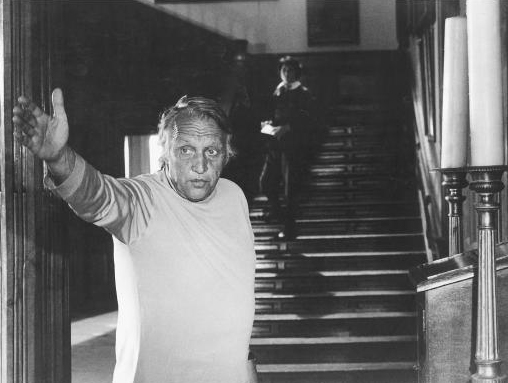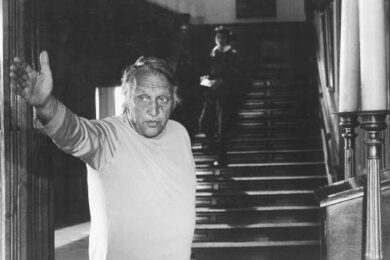One might be forgiven for thinking that there were two Joseph Loseys. His obsession with mirrors is well-documented: shots of them abound in his films – emphasising both the flatness of the cinematic surface in the manner of a modernist painter, as well as the duplicity of his characters. It has even been said that Losey would refuse to have sex without the presence of a mirror. Reading the amassed critical writing on Losey on the web one is inclined to suspect his reflection of escaping the tain and walking among us, making films no less! Like his Mr Klein, Losey’s reputation is haunted by his doppelganger. His ouevre is so schizophrenic that Ring director, Hideo Nakata, named his documentary tribute, Joseph Losey: The Man With Four Names (a reference to the various different pseudonyms he used after being blacklisted by Joseph McCarthy’s House Un-American Activities Commission). There is the auteur Losey, beloved of Cahiers du Cinema – the Losey of the three great collaborations with Harold Pinter (The Servant, Accident and The Go-Between). Then there is that other, less respectable, Joseph Losey – Losey the fool, director of those kitsch-trash cinema classics, Modesty Blaise and Boom! (hymned by John Waters as "failed art"). Almost never discussed together, these two Joseph Loseys are forever but a click away from each other.
However, as if things weren’t complicated enough, I would like to draw attention to a third Losey (not quite Nakata’s fourth) – Losey the activist. In a sense, isn’t the activist film maker always damned to be seen as both auteur genius and misguided fool at once? Prey to a slavish devotion, like Jean-Luc Godard, or dismissed as wrong-headed and opportunistic, like Oliver Stone. Even worse, there is always the risk that one’s work may suffer with the historical reputation of the ideology it represented, to the point of eclipsing it completely, as with Leni Reifenstahl. In Losey’s case, even the history of his political commitment is riven with contradictions. His very first short film, made at a time when he had been working with Bertolt Brecht and Kurt Weill and was heavily involved in numerous left-wing community theatre projects, was entitled Pete Roleum and His Cousins – a promotional film for Standard Oil to be shown at the 1939 New York World’s Fair.
During a Q&A after a screening of his own assured debut feature, The Hide, Marek Losey, grandson to Joseph and son to producer Gavrik Losey (who worked on both Lindsay Anderson’s If… and The Beatles’ Magical Mystery Tour), confessed that his favourite of his grandfather’s films was The Boy with Green Hair. A polemic, disguised as a parable, against war and intolerance, The Boy with Green Hair is shot rather like a classic Hollywood melodrama, "in the style of Meet Me in St. Louis," as Marek said, but for occasional fantasy sequences that resemble, in their vivid poster paint colours, Powell and Pressburger’s version of Offenbach’s The Tales of Hoffman. Here style is used like camouflage for Losey’s political message – which is at one point addressed directly to the camera by the young Dean Stockwell’s Peter Fry, "They [grown-ups, those in authority] think that everyone has to get killed. The world doesn’t have to be blown up." It is from this film on that Losey develops a particular sensitivity to the plight of those persecuted by society – a trait often attributed to his exile at the hands of the House Un-American Activities Council but actually in evidence somewhat earlier, as The Boy with Green Hair proves. Certainly from his first British film, The Sleeping Tiger, onwards, Losey’s films are overwhelmingly concerned with protagonists cast out and hunted often, as in The Criminal, by their own community.
The precise themes of The Boy with Green Hair are taken up again nearly forty years later in the noir-ish political thriller Mr Klein. In between, Losey had directed King and Country, about class divisions in the trenches of the first world war and the horrific injustices of the military tribunal; Figures in a Landscape, a narrative recalling Beckett, concerning two men on the run for unknown crimes in the barren landscape of an unknown country; The Assassination of Trotsky, imagining the ageing revolutionary strutting around Mexico like a wounded bull, unaware that the matadors are closing in with every moment; and his adaptation of Ibsen’s A Doll’s House, criticised at the time for the feminist sloganeering of Jane Fonda’s character. Her speech sounds fairly tame today, rather too subtle, too mild, but at the time it clearly made its point. Both The Boy with Green Hair and Mr Klein, from the almost the very beginning of Losey’s career and almost the very end, concern individuals persecuted for some minimal trivial detail, the colour of your hair, or the name on your passport. In fact, Mr Klein, set in occupied France, goes into some detail concerning the administration and particularisation of guilt under the Nazis: when your grandmother’s birth certificate could damn you, the precise distance between your eyebrows, or the length of your septum. Jacques Lacan talks of the objet petit a as that which is "in you more than yourself," like an indelible stain, Lady Macbeth’s damn spot. But as with Kafka, the question of whether the hunted character is really guilty or not is ultimately irrelevant to Losey, what matters is the fact of being hunted and oppressed. This moral ambiguity, the inevitability that, even if our protagonist was innocent at the start of the film, he certainly wont be by the end, may be attributable to Losey’s beginnings in film noir (1945’s crime short A Gun in His Hand). Unlike in the noir stories however, for Losey there is always the possibility of escape or of resistance. The kamikaze final stand of MacConnachie in Figures in a Landscape, for all its mad terrorism, is filmed nonetheless as a noble (even Christ-like?) sacrifice that redeems his earlier arrogance and ruthlessness. In The Sleeping Tiger, Dr Esmond’s talking cure is able to relieve Frank of his oedipal urge to self-destructive criminality through a transferential relationship with the doctor. Nora Helmer’s (Jane Fonda) final rejection of her husband is depicted less as tragedy than as a powerful assertion of independent femininity in A Dolls House. In Losey’s final film, Steaming (1985), it is the solidarity of the community of women that provides a bulwark against patriarchy and capital. And in Mr Klein, the simple tracing out, in a childlike, amateurish fashion, of the tune to The Internationale on a piano provides a moment’s hope and resistance, a suicidal assertion of one’s humanity in the face of terror.
"Joseph tended to start off with a political idea and then fit a story around it," said Marek Losey of his grandfather, "Whereas I do it the other way around." Unlike the delicate, yet searingly violent, explorations of class codes and nuances to be found in The Servant or The Go-Between, in Marek’s The Hide, class differences remain the servant to the story, and as such fail to transcend a flat, archetypal sketch. Though The Hide is not without its classic Losey touches, such as in the slippery, multilayered dialogue, it is ultimately this refusal to submit narrative to the rigour of politics that leaves Marek’s otherwise quite beautifully shot, elegantly paced and seductively acted film, nonetheless a lesser work even than many of Joseph’s less celebrated films. At the present time, when even politicians seem to want to distance themselves as much as possible from the messy business of actual politics, a director of Losey’s standard, with both intelligence, technical bravura and a populist touch, yet not afraid to commit openly and explicitly to a political position and see it through in his work, may be sorely needed.



